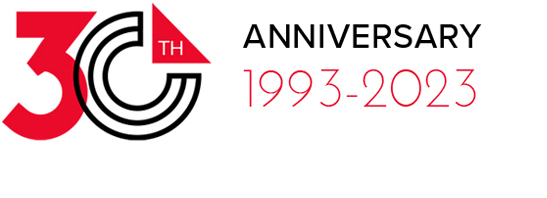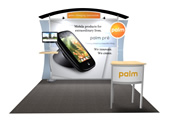Perhaps no term is more hyped and less understood in the exhibit industry than “hybrid.” Nearly every exhibit manufacturer and custom builder refers to their latest designs as portable hybrids, modular, hybrids, or even custom hybrids. Why the emphasis on this term? The answer is simple: Value. More than ever, exhibitors are demanding displays that do everything – assemble quickly, look custom, ship light, and reconfigure. Just a few years ago that would have been impossible, but not any more.
The Building Blocks
If you’ve walked a trade show recently, you’ve seen a profusion of aluminum structures and tension fabric graphics. Those are the building blocks of hybrid displays. Aluminum is attractive, structural, and lightweight. Tension fabric is vibrant, durable, and cost-effective. Together they serve as the creative foundation for displays priced from $4,000 to $250,000.
But what makes them hybrids. For the past 30 years, the exhibit world was divided into two worlds: portable/ modular displays or custom exhibits. Portable/modular displays have been dominated by pop ups, panel displays, and modular laminate exhibits. These “systems” have well-defined configurations, components, and accessories, but limited design flexibility. Custom exhibits, built primarily from wood, have offered exhibitors endless design possibilities but are rarely portable or modular.
Hybrid Exhibit Systems
Hybrid exhibits merge those two worlds. Hybrids start with tension fabric and aluminum extrusion systems (such as MODUL). Beyond that, the design can be anything and can include anything. There are portable hybrids, such as Sacagawea, consisting of an aluminum extrusion frame and tension fabric graphics, which pack in portable roto-molded cases. There are modular hybrids, like Euro LT, which add modular laminate components and pack in roto-molded tubs or small crates. And there are custom hybrids, such as Visionary Designs, which combine extrusion with just about anything else – metal, wood, plex, glass, and sometimes even portable or modular systems. As with all custom exhibits, the final design is whatever fulfills the marketing and budgetary requirements of the client.
Hybrids may not be the ideal for solution for everyone. For many exhibitors, a basic pop up or full custom makes more sense for their exhibit marketing goals. However, hybrid exhibits are here to stay. Only hybrids offer the lightweight strength of aluminum extrusion, the bold impact of tension fabric graphic, and the flexibility of unlimited design – all at a terrific value.
–Mel White
http://www.linkedin.com/in/melmwhite
More Trade Show Tales Blog Posts




